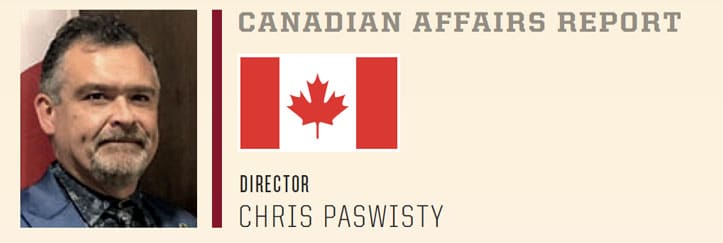
Brothers and sisters,
The North America’s Building Trades Unions (NABTU) held their annual Tradeswomen Build Nations (TWBN) conference in Washington, DC, in early December. Over 4,000 sisters and allies were in attendance, forging the future of the construction industry. The conference provides opportunities for networking, learning and leadership development for all attendees, whether you are an apprentice or a journeyperson. Workshops and plenary sessions were facilitated by tradeswomen and featured union leaders, apprentice coordinators, contractors and politicians.
It was a fun-filled weekend packed with great information. The conference took to the streets for the banner parade to showcase the enthusiasm and opportunities for a career in the trades. I encourage all locals to send a delegation of sisters to the 2024 TWBN conference, which will be held in New Orleans. The weekend will leave you with a renewed sense of purpose and pride in the labour movement. Our SMART delegation has continued to grow over the years, so let’s keep the momentum going and aim to have more in attendance next year.
In November, the Federal Government tabled legislation to implement the Fall Economic Statement, which included labour requirements for Investment Tax Credits (ITCs) for green technologies contained within it. The ITCs will be available for investments in clean technology, clean electricity, clean hydrogen and carbon capture. To be eligible to receive the maximum ITC, employers must adhere to a definition of prevailing wage that is based on multiemployer collective agreements and have at least 10% of work hours be performed by apprentices.
SMART and the Canadian Building Trades have been advocating for years for this kind of prevailing wage language. We are hoping, with your support, that we can ensure the Government gets this legislation across the finish line and into law.
The theme of last year’s SMART Leadership Conference, held in August, was “This is Our Time” — and that sentiment couldn’t be truer. With wildfires burning across the country and health advisories being issued almost daily across North America, our skills are needed now more than ever. Fresh air and ventilation verification have never been more important. With news stories regarding ventilation issues in Saskatchewan and New Brunswick, indoor air quality is front and centre. And in Ontario, the New Democratic Party has announced that it will be presenting a private members’ bill to improve indoor air safety.
Grassroots groups like Ontario School Safety are advocating for safer school environments in Canada, particularly improved air quality. While the initial focus was on COVID-19 protection, concerns have expanded to other respiratory threats, including the flu, respiratory syncytial virus and pollutants like wildfire smoke. Experts and parent groups emphasize the need for better ventilation and air filtration, suggesting schools consider upgrading to MERV 13 filters in their HVAC systems.
A memo from September 2023 by Ontario Education Minister Stephen Lecce stated the province’s requirement for a standalone HEPA filter in specific classrooms and areas without adequate mechanical ventilation or lacking MERV 13 filters. The province has dedicated over $665 million towards enhancing air quality in schools, implementing over 100,000 HEPA units, and has allocated an additional $30 million for the upcoming school year for higher-grade filters.
We must collectively use our expertise and meet with local, provincial and federal governments to ensure that our members’ skills are recognized and utilized in constructing healthy buildings and healthy homes.
Clean air concerns are not just limited to schools. This past summer, wildfires caused dangerously high levels of smoke and chemicals in communities across the country. Often, buildings like libraries, schools and malls are designated as cleaner air spaces for the public to find respite from wildfire smoke. With the increasing effects of climate change leading to more frequent wildfires, these safe havens are becoming even more essential. To address this, some towns, such as Renfrew, Ontario, have transformed public buildings into clean-air shelters equipped with strong air filtration systems to protect against harmful particles.
However, at present, clean-air shelters operate sporadically. There is an absence of provincially regulated alert systems, and no standardized method of informing the public about which shelters are operational. There’s a growing call among advocates for Canadian cities to introduce an automatic mechanism, activating all designated clean-air shelters (free of charge) if an area’s air quality remains in the “moderate” bracket for more than two consecutive days. In the face of the ongoing climate crisis, it’s vital for Canada to prioritize health-focused initiatives, starting from the federal tier and extending down to the provincial and municipal levels. We must collectively use our expertise and meet with local, provincial and federal governments to ensure that our members’ skills are recognized and utilized in constructing healthy buildings and healthy homes.
As we begin a new year, we must remember that this is our time. Our time to organize, our time to grow and our time to expand our contractor base. We must bring into our membership everyone that works in our trades. We must utilize all our tools to organize, and we need our membership involved by adopting the SMART Incentive Program. By having our members recruiting the next generation of workers, we will build our locals and set the standard for generations.
We have been growing momentum as we strive for a better Canada and a brighter future. Please continue to stay active, get involved and stay safe!
In Solidarity,

Chris Paswisty
Director of Canadian Affairs
Related News
- SMART Canada statement on National Roofing Week
- Special Focus: SMART launches childcare benefit
- United across our two nations
- What we pay for
- Advancing safety and strengthening unity
- Taking the initiative across Canada
- REEF Act passed in win for rail workers
- SMART members fight for a just future at Martin Luther King Conference
- Ontario organizers hold training to grow our union
- Solidarity forever: Members help members after California fires